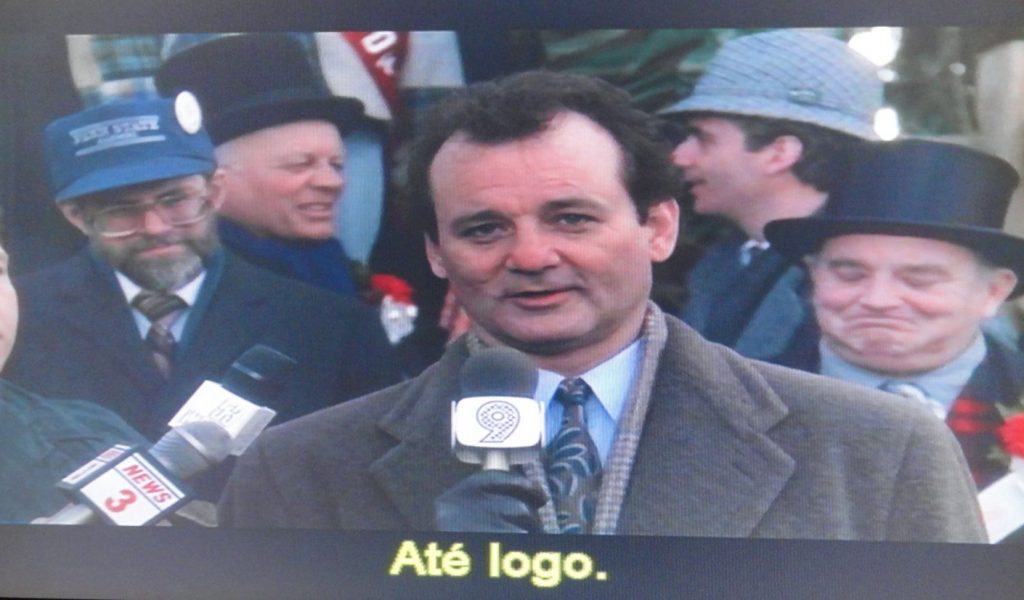
“Groundhog Day” is one of my favorite movies. I was watching it this morning, dubbed into Portuguese with Portuguese subtitles, so I could assuage my guilt for not studying enough.
I like it for several reasons. One is unrelated to the movie itself. The movie was on cable at the Condo where we stayed when we took the kids to the theme parks in Orlando back in 1994. It seemed to be on over and over, so I recall it being on the whole time. It was a good time. The kids were excited about Disneyland etc. The weather was perfect that October when we went and our sense of relief was accentuated because we were coming from Krakow, where the weather was turning bad and – more significantly – the air pollution in those days was horrendous. So I remember being in a clean, green place with Chrissy and the kids having a good time. Everything associated with that basks in the glory of that moment, including “Groundhog Day”. But there must have been other things on too that I don’t recall. “Groundhog Day” had other things going for it.

The setting is comforting. The movie is set in Punxsutawney, Pennsylvania, but it was filmed somewhere in Illinois, so it has a thoroughly Middle American feel. Of course, I have never actually seen a small-medium sized city that is as lively or has so many diverse things to do, but it is nice to imagine.
If you have not seen the movie, you should. A brief summary is that a weather man comes to Punxsutawney for the annual groundhog festival, but each day he wakes up to the same day. It repeats, over and over. They never say how long this happens, but it is a long time, maybe thousands of years’ worth of February 2. The main character, Phil Connors played by Bill Murray, goes through predicable stages. At first he is confused; after that he takes advantage of life with no consequences; then he gets depressed and kills himself many times in many ways, but each day he wakes up in the same place. Finally he decides to live in the moment. He improves himself by reading and learns to play the piano. He also improves the lives of the people around him w/o any expectation of personal gain. He does these things essentially because they are the right things to do at the time when he does them. Finally, after living the perfect day, he progresses to the next day and that is the end.

The movie raises lots of philosophical questions, but it does it in a stealthy almost unconscious way, which makes it such a unique film. I suppose you could watch the whole thing just for the fun of it w/o getting any deeper than the funny lines and situations. But I think it would be hard not to think about it, if you were at all paying attention. Most of us have thought about how we might do things differently if we could do things over again, if we had a second chance. This takes us a little beyond that. What should be your ethics in a world where there are no permanent consequences to your actions? I think that the film leads to the conclusion that there ARE permanent consequences, even if external conditions don’t change, because the consequences are contained in the person, who chooses, or not, to do the right thing. The movie is a story of personal development, of redemption.

Phil starts out a selfish a-hole, who after many renditions of the same day develops into a man balanced and at peace with himself. It is not the he just becomes unselfish and helpful to others. More profoundly, he becomes selfless in the true sense of the term. He merges himself with the people, things and the place around him. He becomes his task no matter what it is, he becomes what he does and loses himself in it. He no longer works on being good, no longer thinks about doing the right thing, he just does it because it has become what he is.
I suppose I am reading way too much into a Bill Murray movie. But I have read many books of wisdom: the Zen of this, the Tao of that or meaning of everything. I am not saying that watching the movie is the one-big-thing. There is no one-big-thing; however, if someone asked me about the great spiritual sources, I would include this movie. Like all works of philosophy, it should be watched, considered and discussed over time. The book – or in this case the movie – doesn’t change but your different experiences make it different each time. That is why it is impossible to understand any philosophy at the first sitting. It takes a while to sink in, maybe years with differing conditions.
Lately I have been giving a more philosophical career advice. I tell the young people who ask me that they should strive to become the person they want to be, become the person who deserves success rather than strive for success itself. Success can be limited. Only a few people can be the bosses, champions or among the best at anything. But everybody can aspire to become what they think is a good person. Reasonable success will almost assuredly follow anyway, but no matter what, you will have something of value when you are finished.
The picture up top I took of the TV with “Groundhog Day” playing. The other pictures I took when I was wandering around getting the car serviced. You can see Fairfax Honda and the Borders Book where I got the Hadrian book I wrote about yesterday. The last one shows the respect that pedestrians get around there. I was clearly in the middle of a car-preferred zone. It is no place for old men, since you have to make a run for it when you want to cross the road.
